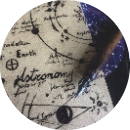Read each main idea and then quickly skim the reading passage to find the paragraph it describes. Write the letter of the paragraph in the space.
A It seems every day that Elon Musk makes headline news. The inventor, engineer, and entrepreneur is involved with several innovative projects: Tesla electric cars, OpenAI artificial intelligence, Hyperloop high-speed transportation systems, supersonic jet aircraft, and SolarCity. But Musk's most noteworthy project is SpaceX which is dedicated to advancing rocket and spacecraft technology with the aim of establishing a self-sustaining settlement on Mars.
B Space Exploration Technologies - better known by its nickname SpaceX - was started in 2002 with the long term goal of establishing "a spacefaring civilization." Musk is making a comparison with the seafaring that characterized the Age of Exploration from the late 1400s to the 1700s. During that period, Europeans explored parts of the world that had previously been unknown. The exploration led to settlements, trade, and exchanges between all parts of the world. Recently, Musk said, "The future of humanity is fundamentally going to bifurcate along one of two directions: Either we're going to become a multiplanet species and a spacefaring civilization, or we're going to be stuck on one planet until some eventual extinction event."1
C Musk is not exactly sure what might wipe out humans on planet Earth, but some ideas are an asteroid, a super volcano eruption, a virus or even catastrophic global warming. But aside from the threats, he is eager to move into space, not only to explore it but also to establish a human colony on Mars.
D Around 2002, Musk saw flaws in the existing space program which was based on the space shuttle and expensive rockets that could only be used once. He was determined to design and create reusable rockets that make space exploration much less expensive. By 2015, SpaceX had developed and tested the first rocket booster that was able to land and be used again. NASA, the US national space agency, gave SpaceX contracts to transport crew and cargo to the International Space Station (ISS) after they retired the space shuttle.
E In September 2016, Musk announced his plans to send the first people to Mars by 2025. After that, large numbers of people would become settlers, but they would need to be supplied with everything necessary for life. Musk says, "What really matters is being able to send a large number of people, like tens of thousands if not hundreds of thousands of people, and ultimately millions of tons of cargo."2 That's why he thinks reusable rockets are so important.
F Establishing a colony on Mars has many challenges. First is the need to fuel the spacecraft from the sun's energy outside Earth's atmosphere. There are problems transporting all the supplies needed to sustain life including air, food, and water. Landing a spacecraft on Mars gently would be tricky. Then there are the human problems. Research on astronauts at the ISS has shown that living for a long time in a weightless situation causes bone loss, vision problems, and perhaps psychological changes. Lastly, there's no quick trip back to Earth in emergencies.
G Experts in space technology have had mixed reactions to Musk's plan. Some see the program as too ambitious or are concerned about the schedule. Others acknowledge the need for space exploration and settlement and admire Musk's vision. Kenny Todd, an operations manager for NASA's Johnson Space Center, put it this way: "You gotta start somewhere. You gotta start with dreaming," Todd said, "And sometime in there, things become actual."3
1 Source of quote: Elon Musk: A Million Humans Could Live on Mars By the 2060s by Nadia Drake (news.nationalgeographic.com)
2, 3 Source of quotes: Mars: Inside the High-Risk, High-Stakes Race to the Red Planet by Joel Achenbach (nationalgeographic.com)
30. A comparison between past and future exploration
31. Difficulties associated with settlement on Mars
32. Information about Musk's other roles and projects
33. Reasons why SpaceX developed reusable rockets
34. An idea of how many people would be involved in settling on Mars









